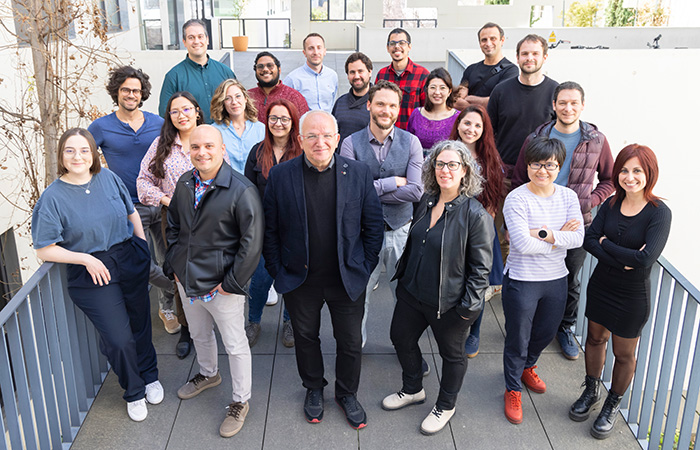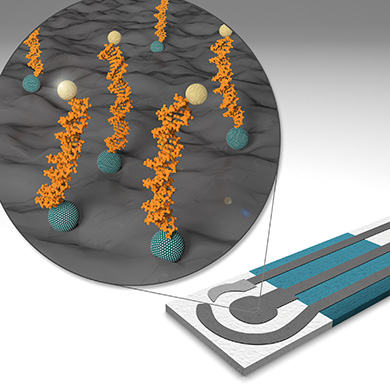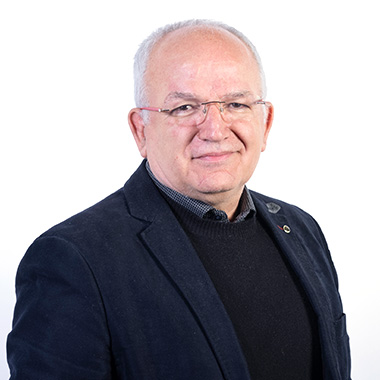NanoBioelectronics and Biosensors
Group Leader: Arben Merkoçi

Main Research Lines
Innovative nanocomposites with improved electronic/catalytic properties, spatially-oriented anchoring substrates and highly sensitive electro/colorimetric readouts for sensing applications
Paper-based biosensors (e.g. lateral flow) modified with laser patterned rGO to enable electrochemical sensing on paper substrates without altering the paper microfluidic properties, thanks to the stamping method
Plug & play printing platforms for the ubiquitous fabrication of low-cost and environmental-friendly nanomaterial biosensors with nanofunctional inks, using commercially available office printers
Multilayered graphene and metal nanoparticle sensors printed on flexible polymers for the development of sensitive biosensors with impedimetric readout

In 2022 the group has continued working on the following European projects, in addition to national projects. The first one, MICROB-PREDICT (Microbiome-based biomarkers to predict decompensation of liver cirrhosis and treatment response) aims to develop personalised strategies to prevent and treat decompensated cirrhosis and acute-on-chronic liver failure by investigating the human gut microbiome. The second one, CORE 3, is part of the Graphene Flagship project and focuses on the development of graphene-based sensors. The third EU project is EMERGE (Emerging Printed Electronics Research Infrastructure).
The fourth international project is GLEBIOASSAY in collaboration with the Hospital Sant Joan de Déu (Spain) and Palacký University Olomouc (UP) /CATRIN (Czech Republic). This project, funded through the EuroNanoMed-III call, aims to develop a multiplexed point-of-care nanobiosensing platform to monitor the efficacy of the naxitamab-based immunotherapy in neuroblastoma.
We also continued working on our two national projects: NANOANAEMIA (Multiplexed nanobiosensor for the instantaneous diagnosis and classification of anaemia at the point of care) and PAPYRUS (Polymerase Amplification combined into a Paper-based electrochemical lateral flow arraY for antimicrobial Resistance qUantification).
Group Leader

Arben Merkoçi
ICREA Research Professor
arben.merkoci@icn2.cat
ICREA Research Professor and leader of the ICN2 Nanobioelectronics and Biosensors Group, Arben Merkoçi obtained his PhD at the University of Tirana (Albania) in ion selective electrodes. Since 1992 he has carried out research as postdoctoral fellow and research professor at the Polytechnic University of Budapest (Hungary), University of Ioannina (Greece), Università degli Studi di Padova (Italy), Universitat Politècnica de Catalunya, Universitat Autònoma de Barcelona and New Mexico State University (USA). His research is focused on the integration of biological molecules and other species with micro- and nanostructures to design novel (bio)sensors. He is member of the Academy of Sciences of Albania and director and coordinator of NANOALB (www.nanoalb.al), the regional network of nanoscience and nanotechnology.
Prof. Merkoçi is Co-Editor in Chief of Biosensors and Bioelectronics, the principal international journal devoted to research, design development and application of biosensors and bioelectronics, member of editorial board of Electroanalysis, Microchimica Acta and other journals.
Prof. Merkoçi has published 353 articles (H-index / citations: Google Scholar 91 / 32689; WOS 81 / 25064) and supervised 40 finished PhD theses. He is also involved in teaching PhD courses in the field of nanomaterial- based biosensors in several Spanish and international centres. He has been a member of the commission for establishing the new Nanoscience and Nanotechnology undergraduate academic curriculum at the UAB, the first one in Spain, which started during the academic year 2010- 2011. He is a member of the Academics Working Group of BIST and coordinator of the Nanodiagnostics module of the Nanotechnology Master at the UAB.

